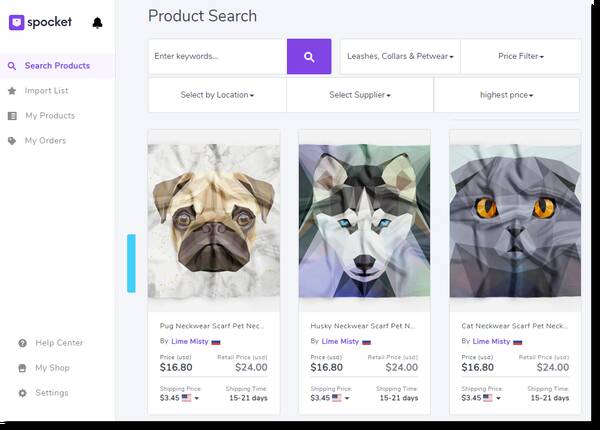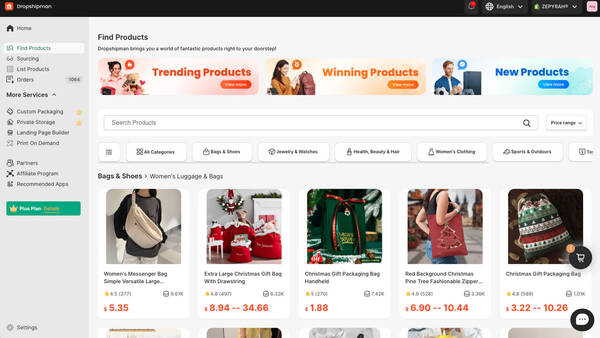When comparing Shopify and Wix for dropshipping, both platforms offer useful tools, but they cater to slightly different needs and levels of eCommerce experience.
Here’s a breakdown to help you decide which might be better for your dropshipping business:
1. Ease of Use
- Shopify: Primarily designed for eCommerce, Shopify has a user-friendly interface and focuses on building and managing online stores. The platform has built-in tools that streamline dropshipping setup and management.
- Wix: Known for its drag-and-drop editor, Wix is highly customizable and easy to use, especially for beginners. However, its eCommerce features aren’t as specialized as Shopify’s.
Findout how Shopify compare itself to Wix
2. Dropshipping Integrations
- Shopify: Shopify excels in this area with direct integrations to popular dropshipping apps like Oberlo, DSers, Spocket, and more. These integrations streamline the process, allowing you to import products, handle orders, and track shipments.
- Wix: Wix also offers dropshipping integrations, including Modalyst and Spocket, but the selection is more limited than Shopify. However, it still covers the essentials for beginners.
Debutify | Top-Rated Shopify Theme with AI Widgets
Debutify is more than just a Shopify theme.
It gives you themes, templates, and built-in apps that are easy to use, flexible, plug-and-play, and quick to set up so you focus on growing your brand. It’s perfect for brand owners in any niche.


3. Payment Options
- Shopify: Offers numerous payment gateway integrations globally and includes Shopify Payments for a streamlined checkout experience. Shopify Payments has no extra transaction fees, but if you use a third-party gateway, Shopify charges a transaction fee (0.5% – 2%).
- Wix: Wix also has several payment integrations and offers Wix Payments. Wix doesn’t charge additional transaction fees, though third-party gateway fees may still apply.
Learn More: Top 10 Spy App Affiliate Programs
4. Pricing
- Shopify: Shopify’s pricing is structured in tiers ($29/month for Basic, $79/month for Shopify, and $299/month for Advanced). While more expensive, Shopify’s plans include advanced tools ideal for scaling an online store.
- Wix: Wix has a more affordable pricing structure, starting from around $17/month for Business Basic, suitable for smaller stores and beginners. However, advanced eCommerce features are limited compared to Shopify.
5. Customization & Design
- Shopify: Provides a wide range of themes, many optimized for eCommerce. Customization is possible, but more advanced customizations may require coding skills (HTML/CSS).
- Wix: Wix’s drag-and-drop editor offers more design flexibility, letting users create highly customized storefronts. However, some design elements may not be optimized for eCommerce efficiency.
6. Scalability
- Shopify: Shopify is ideal for scaling, with a robust infrastructure that supports high-traffic stores and an extensive app ecosystem. As your business grows, Shopify provides tools and support for handling larger volumes of orders and inventory.
- Wix: Wix is best for small to medium-sized stores. While it can support a growing business, it doesn’t match Shopify’s capacity for handling high-volume eCommerce needs.
7. SEO & Marketing Tools
- Shopify: Offers strong SEO and marketing tools specifically for eCommerce, including abandoned cart recovery and built-in email marketing.
- Wix: Wix has SEO tools and some marketing options, but its eCommerce-specific tools for marketing are not as robust as Shopify’s.
Verdict
- Shopify is generally better suited for dedicated eCommerce businesses focused on scaling and serious about dropshipping. It’s more powerful for handling product volume and has a robust app ecosystem to streamline the dropshipping process.
- Wix is better for beginners, smaller stores, or those who want more design flexibility and are just starting with dropshipping. It’s also more affordable, making it a good choice if you’re on a tighter budget or testing the waters.
Recommendation: If you plan to scale your dropshipping business and need specialized features, Shopify is the stronger option. If you prioritize customization and affordability for a smaller store, Wix is worth considering.
